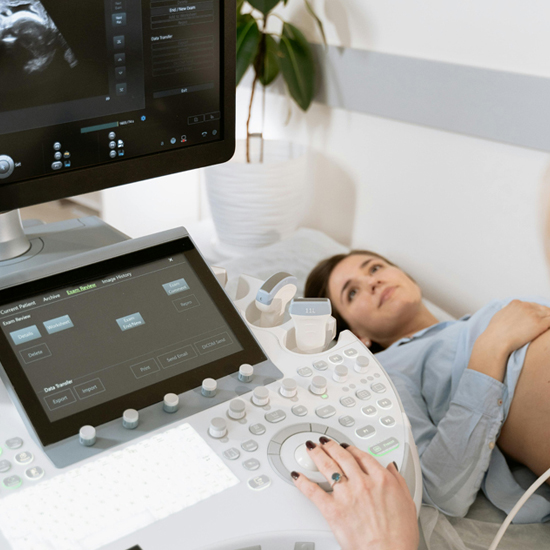
At the Forefront of Treatment
Understanding Endometriosis & Its Impact on Fertility
Endometriosis is a common yet often misunderstood condition that affects approximately 10% of women of reproductive age (Zondervan et al., 2020).
It occurs when tissue similar to the endometrium (the lining of the uterus) grows outside the uterus, if it grows inside the ovaries it will cause a distinct ovarian cyst called endometrioma or if in grows into the muscle of the womb it will be called adenomyosis, it can be superficial lesion or it can be deep nodule and is divided into 4 stages according to its extent and severity, key hole surgery (Laparoscopy is the gold standard for diagnosis of endometriosis).
Third of the women suffering from endometriosis will have no symptoms while the rest will have pain as a aresult of the chronic inflammation and, in some cases, endometriosis can be associated with fertility problems.
Research suggests that up to 50% of women struggling with infertility have endometriosis (Ozkan et al., 2008). although the cause is not fully established. Even with severe endometriosis, natural conception is still possible. It is estimated that 60-70% of those with endometriosis can get pregnant spontaneously.

Endometriosis Causes & Complications
Endometriosis & Fertility
Endometriosis is thought to impact fertility in several ways
Mechanical Factors
Endometriosis can lead to anatomical distortion, pelvic adhesions, and even tubal blockage, preventing the egg and sperm from meeting.
Inflammatory Effects
Chronic inflammation in the pelvic area can impair egg quality, embryo implantation, and sperm function.
Ovarian Endometriomas
These cysts, found in nearly 50% of cases, can damage ovarian tissue, reduce ovarian reserve, and lead to lower Anti-Müllerian Hormone (AMH) levels and antral follicle counts (Hamdan, Dunselman et al., 2015).
Hormonal Imbalance
Endometriosis can disrupt hormonal function, causing progesterone resistance that can interfere with embryo implantation.

Expert Care, Dedicated to Supporting You
Exploring your options in the journey to parenthood
Does Surgery Improve Fertility?
For women with superficial endometriosis (where tissue attaches to the peritoneum), laparoscopic surgery has been shown to improve natural conception rates and this is more obvious in women younger than 35 years old.
However, for those with deep endometriosis (involving the bowel, bladder, or ureter), evidence regarding the impact of surgery on fertility outcomes is less clear.
Furthermore, while surgical removal of ovarian endometriomas may be necessary in some cases, it is associated with a decline in ovarian reserve, particularly if the condition affects both ovaries or if repeated surgeries are needed (Raffi et al., 2012; Kwon et al., 2014).
Assisted Reproductive Technologies (ART) for Endometriosis-Associated Infertility
For women with moderate to severe endometriosis or those who have not conceived naturally following surgery, assisted reproductive technologies (ART) such as in vitro fertilization (IVF) or intracytoplasmic sperm injection (ICSI) may be necessary.
While studies have shown that women with endometriosis tend to produce fewer eggs and have lower implantation rates, large-scale data indicate that live birth rates with ART are comparable to those of women with other infertility causes, provided no additional fertility factors are involved (Senapati et al., 2016; Murta et al., 2018).
Hope for Women with Endometriosis
Endometriosis-related infertility is complex, but effective treatment options are available. Whether through laparoscopic surgery, ovarian reserve optimization, or advanced fertility treatments such as IVF, a personalized approach can significantly improve the chances of conception.
If you have endometriosis and are struggling to conceive, you don’t have to navigate this journey alone. As a highly experienced fertility specialist, I have helped countless women overcome the challenges of endometriosis-related infertility and achieve successful pregnancies.
Book a consultation today to explore your options and take the next step toward parenthood!
